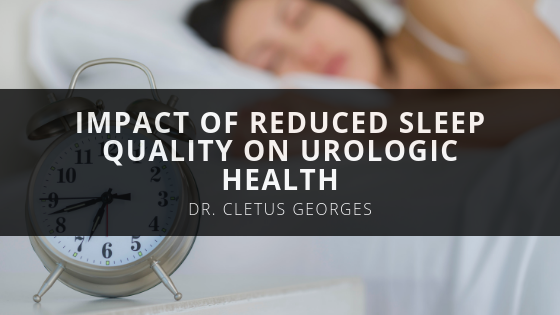Urology specialist Dr. Cletus Georges explores the links between sleep disorders, erectile dysfunction, and testosterone deficiency in male patients.
From cardiovascular disease to obesity, poor sleep has long been associated with a variety of serious health complaints. Also understood to negatively impact urologic health, Dr. Cletus Georges, a leading urologist located in Orlando, Florida, considers the impact of a lack of sleep on conditions including erectile dysfunction and low testosterone.
“Ties between diagnosed sleep disorders and erectile dysfunction are well established,” explains Dr. Georges. As many as 80 percent of men, for example, he says, diagnosed with obstructive sleep apnea are believed to suffer from reduced erectile function.
More generally, insomnia is identified as a risk factor for sexual dysfunction in older men, according to Dr. Cletus Georges, something which he says is theorized to be linked to naturally decreasing testosterone levels. Other sleep disorders, including so-called restless leg syndrome, are also believed to be tied to an increased prevalence of erectile dysfunction. “The underlying relationship, however,” adds Dr. Georges, “remains largely unclear.”
With that said, where a patient is diagnosed with erectile dysfunction and also reports an inability to achieve adequate sleep, expert instruction on improving sleep quality is widely reported to have a beneficial effect on sexual function, according to the urologist. “Further to work patterns, smoking, and caffeine and medication use, controlled analysis is well documented as independently associated with poor erectile function,” reveals Dr. Cletus Georges.
Dr. Cletus Georges also briefly touches on the association between reduced sleep quality and testosterone deficiency. “Also responsible for decreased libido, lower testosterone levels are known to be a symptom of insomnia and other difficulties sleeping,” he explains. In fact, testosterone levels are known to drop with each hour of lost sleep, according to the expert.
While such a drop in testosterone levels may be largely negligible when sleep is lost in small amounts, an increased need to urinate at night as patients age can see the issue amplified significantly. “Nocturia, a condition in which a patient wakes up repeatedly during the night to urinate, can cause disturbed sleep serious enough to have a marked impact on testosterone levels,” says Dr. Cletus Georges.
More prevalent in older patients, this repeated sleep disturbance, he says, can, as a result, pose a serious threat to male patients’ urologic health.
“With poor sleep quality also a factor in diabetes, cardiovascular disease, and other serious conditions, as well as contributing toward poor urologic health, assessment of sleep should be considered extremely important,” adds Dr. Cletus Georges, wrapping up, “and should be deemed a vital aspect of care for patients experiencing urologic complaints such as erectile dysfunction and low testosterone levels.”


